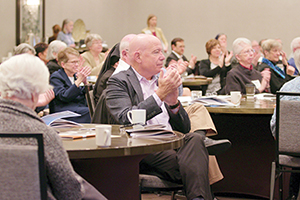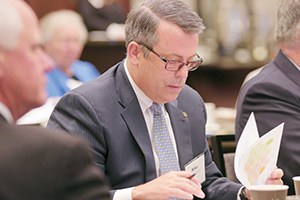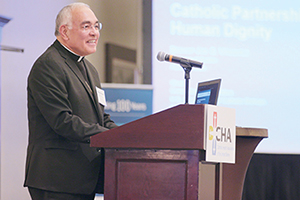By JUDITH VANDEWATER
FORT WORTH, Texas — Ministry leaders including sponsors, chief executives and mission executives gathered here in late January to discuss pressing challenges and mission-critical issues in Catholic health care.
Convened by CHA, the meeting was the second in the biennial Critical Conversations assemblages. It was a forum for CHA members to share information and expertise with each other and offer input that will inform CHA's ongoing work in advancing Catholic health care as a ministry of the church.

That work includes developing a ministerial identity assessment tool that hospitals, non-acute settings and health systems can opt to use to measure the extent to which Catholic social teaching and values permeate their work from the back offices to the bedside.
CHA also is involved in an ongoing effort to assist the ministry in succession planning and talent development of ethicists, mission leaders and pastoral care providers. It is expected that a wave of retirements will create widespread vacancies in those essential areas in the near term.
To set context for the discussions on those and other topics, Sr. Carol Keehan, DC, CHA's president and chief executive officer, laid out the association's fiscal year 2018-2020 strategic goals and framed the business challenges facing Catholic health systems today. She said reliable and equitable streams of reimbursement are necessary to support the provision of quality health care, to promote population health, to fund community benefit programs and to offset the unreimbursed costs of caring for the poor and the vulnerable. The latter is core to a hospital or health system's Catholic identity.
Catholic health providers are being squeezed by hyperinflation in pharmacy and medical device costs, by downward reimbursement pressures from private and public insurers and by a notable uptick in the number of uninsured and the threat that the number of insured will continue to decline owing to changes in federal policy, Sr. Carol said.
"We really don't have leadership in Congress or in the White House that values health care for all," she told the audience of 70-plus executives.
Sr. Carol expressed alarm about continuing threats to the Affordable Care Act, which had greatly expanded the number of insured in the U.S., and about the overall direction of health care policy.
In the short term, health care spending is an attractive target for legislators looking both to offset deep revenue cuts set out in the recent tax cut legislation and to raise money to pay for proposed increases in military and infrastructure spending, she said. "We need to be very much on guard," she said.
Sr. Carol said Catholic health care has endured through times of prejudice, economic depression and recession, price freezes and world wars — its resilience a function of faith and commitment to core principles. "Catholic health care is worth fighting for," Sr. Carol said. "You see what Catholic health care contributes to this nation. You see it from the perspective of our faith." Sr. Carol said Christ himself called healing "a sign of the kingdom."
Defining Catholic health care
Participants in the first Critical Conversations meeting in 2016 asked CHA to develop a list of the shared, essential elements of Catholic identity including adherence to the Ethical and Religious Directives for Catholic Health Care Services. They called on CHA to build a tool that members of the health ministry could employ to evaluate the extent to which Catholicity underlies decision-making and caregiving in their organizations. CHA convened a committee of mission leaders from around the county that has worked for two years to answer that charge.

Chris Ryan/© CHA
Brian Smith, CHA's senior director of mission integration and leadership formation, said the tool is in near final form and it is expected to be piloted this month and next by four facilities — two in the Providence St. Joseph Health system and two in the Covenant Health system. Smith said he hopes the results of those pilots will be ready to present in a breakout session at the Catholic Health Assembly in San Diego, June 10-12. CHA expects to make the tool available to the ministry this summer.
The foundation of the tool is CHA's "Shared Statement of Identity," and the association's seven core commitments, which include acting as a ministry of the church, promoting and defending human dignity, attending to the whole person, promoting the common good, caring for people who are poor and vulnerable, acting on behalf of justice and stewarding resources.
The tool sets out key performance indicators in each of those seven areas along with a scoring system to be used by internal and/or external reviewers. Some of the performance indicators are fundamental to Catholic health care — such as the availability of sacraments and adherence to the ERDs — some are aspirational. Smith said the auditing tool can be used by internal reviewers; or, at the invitation of CHA member facilities, CHA potentially could arrange for assessment teams of ministry volunteers to conduct audits using the tool.
He emphasized that the tool is not prescriptive, nor is it intended to supplant assessment processes and tools already in use by some in the ministry, including assessments by outside vendors such as the Veritas Institute's Catholic Identity Matrix, CHAN Healthcare, or ethics audits by the National Catholic Bioethics Center.
Hospitals, health systems and medical practices and outpatient facilities that opt to use the CHA tool will be able to use it in its entirety or select core elements a la carte. Smith said it is designed for use in acute care, outpatient and long-term care facilities. The user can shape the assessment to meet criteria and interests of local ordinaries.
Ethics, mission, pastoral care
Sr. Mary Haddad, RSM, CHA's vice president of sponsorship and mission services, addressed the ministry-wide necessity to attract and groom younger professionals for careers as ethicists, chaplains and mission leaders. The majority of mission leaders and pastoral care providers in Catholic health care are over age 60, and fewer than 40 percent of ethicists are under the age of 50.
Sr. Haddad said college students, even those pursuing nursing and theology degrees, generally aren't aware of these jobs. Another challenge in recruitment is that compensation, particularly for chaplains, has been historically low as compared with other health care professions. Senior mission executives do not always command salaries comparable to other vice presidents.
"We have a great deal of work to do to market these positions," Sr. Haddad said. Currently, with so few people entering these fields, ministry members tend to recruit talent from each other. "We have the same players moving around all the time," she said. To increase the talent pool and plan for succession, she said ministry members should consider raising salaries to be competitive with other fields, and cultivating new talent by creating internships and entry-level positions with career paths in mission, ethics and pastoral care.
John Finan Jr., a ministry executive who promoted and recognized young talent within the Franciscan Missionaries of Our Lady Health System in Baton Rouge, La., led a conversation around succession planning. Finan retired from FMOL in mid- February after more than two decades as its top executive. He said health systems should be open to looking to other disciplines to identify internal candidates. Finan and members of the audience said such prospects would require spiritual depth, aptitude and interest to pursue degrees in theology or ethics and be mentored and trained for jobs in ethics, mission and pastoral care.
Ron Hamel, president of SSM Health Ministries, said that some of the firms that benchmark compensation for mission and ethics executives may set the salaries low because they do not understand the skills and responsibilities of those positions.
Finan said scoring those jobs to create a salary benchmark for mission leaders could be a role for CHA.

